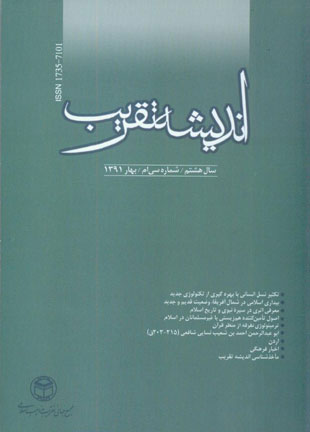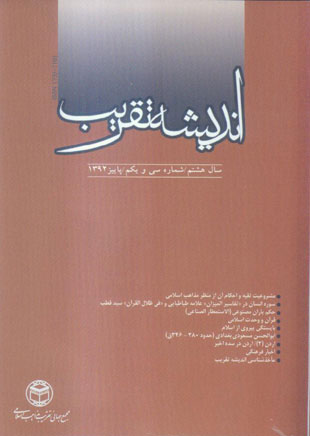فهرست مطالب

فصلنامه اندیشه تقریب
پیاپی 30 (بهار 1391)
- تاریخ انتشار: 1391/05/04
- تعداد عناوین: 11
-
صفحه 5
- مقالات اندیشه ای
-
صفحه 81
- پیشگامان تقریب
- سرزمین های جهان اسلام
-
صفحه 125
-
صفحه 139
-
صفحه 167
-
صفحه 183
-
Page 11Human cloning by modern technologies takes several forms. Using incubators (including inside or outside womb) or genetic engineering for changing sex (boy to girl or vice versa) is approved religiously if the religious obligations are observed particularly regarding matrimonial relationships. There are several opponents and proponents among scientists and Fogaha concerning cloning method, which is done through core cell of a live being. Each side presents their supports and proofs for their idea, which are exaggerated in some cases. The present article lists the supporter's ideas and reasons in short and concludes that due to the fact that knowledge belongs to the entire mankind and that man cannot be banned from scientific development under the excuse of some assumptions therefore the issue of cloning is not religiously forbidden; of course after observing religious rules.Keywords: human cloning, genetic engineering, cloning, religious conditions
-
Page 25When Bu-Aziz, the Egyptian street seller, was battered by police officers and when his stall was confiscated by the police he set himself on fire. No one knew then that his protest would set the corrupt regime in Egypt and the Arab dictator on fire. This event raises several questions i.e. whether Bu-Aziz’s job was the only factor sparkling revolution in Arab countries in North Africa? Whether the history of fight against dictatorship and colonialism played a part in this Islamic awakening? What is the role of past and present Islamist leaders in expansion of this uprising? What trend the Arab movements are following? What are the threats and damages threatening the modern Islamic movements in North Africa? The author attempts to answer such questions in the present paper.Keywords: Islamic awakening, Arab world, North Africa, Egypt, Tunisia, Libya
-
Page 45Among other books and resources concerning the Prophet, there is a book entitled, ''Al-Mustasgha'' whose author, Abul-Karam Abdulsalam Mohammad Ibn Hassan Ibn Ali Al-Haji Al-Ferdowsi Al- Andarsafani, is not a well-known author. The author lived during the late sixth century. The book is in Arabic and apparently, there is no manuscript of the book available. The author of this article is yet to find the original copy or other copies of the book in the sixth, seventh, and eighth century in spite of profound researches. The only bibliographical work is the precious translation of it into Farsi entitled, ''Maghsad Al-Aghsa Fi Tarjome Al-Mostasgha'' by Hussein Ibn Hassan Kharazmi, a scholar and mystic who lived during the 9th century. The book (parts of which has been corrected by the author of this paper) is about the content of Al-Mustasgha and some information about the author; detailed information about him is not available. Studying this book seems necessary due to the old history of Al- Mustasgha and comprehensive character of the author. In order to introduce this book to the readers, the chapters and historical events of Islam and the sources of the author as well as the translation method are explained shortly.Keywords: Prophet's attitudes, History of Islam, Al, Mustasgha, Maghsad Al Asgha, Andarsefani
-
Page 57Today Non-Muslims, with diverse religious beliefs, live in Muslims countries along with Muslims. Islam has provided instructions regarding relationship of Muslims with individuals whose religions orientations are against Muslims. Islam has provided Muslims with comprehensive set of rules regarding the method of encountering the Non-Muslims. According to the Quranic Surrah: Momtahene, verse eight, Muslims shall coexist with Non-Muslim in peace, unless the Non-Muslims start to move against Muslims. Major principles of coexisting with the Non-Muslims are human dignity, generosity, kindness, justice-seeking, keeping promises, not to forcefully encouraging others to accept a religious belief and inviting others to Islam not forcing them to do so. Some individuals believe that merely Muslims enjoy human dignity and the non-Muslims do not have such a right. Other individuals have a warfare policy and base their international relations on hostility. This paper intends to show that Islam accepts the entire human principles and believes in peaceful coexistence with Non-Muslims.Keywords: believers of divine religions, invitation, justice, human dignity, non, Muslims, Coexistence
-
Page 81Disunity is defined as separation, scatter and distancing. In the Quran and the teachings of Ahl-e Bayt (a.s) this word means distancing of hearts, emotions, beliefs and religious understandings. Such a distance is the result of man’s immoralities and his unethical characteristics, which are rooted in wrong religious beliefs. Disunity has a definition in the entire aspects of life, i.e. personal and social life, family, culture, politics, beliefs, economy and military. This paper intends to find the meaning of disunity according to the Quran. The outcome of this research study is an academic, comprehensive and precise explanation of disunity in all aspects of Muslims’ material and future life. In order to achieve the desired intentions, the author has searched the Quranic verses.Keywords: terminology, disunity, unity, the Quran
-
Page 105Nasayee is one of the great Sunni scholars who wrote several books regarding Islamic traditions. His most well known book ''Al-Sonan Al-Kobra'' is one of the six major Sunni reference books. Sunni and Shiite scholars have admired him and some of the Andalusia and Moroccan scholars have considered his book more important than ''Sahih-e Bokhari (256lunar calendar). Some of the Shiite authors have reported that he was a Shiite Muslim. He was finally killed by the Omawid for writing a book entitled, ''Khasaes Amir Al-Momenin'' and for parsing Imam Ali (a.s). It should be mentioned that after writing ''Khasaes Amir Al- Momenin'' he wrote another book entitled, ''Fadhael Al-Sahabe'' on the characters of Abubakr, Omar and Othman and the companions of the Prophet. However, the people of Damascus could not stand the truth, forced him out of the city, and caused his death. Nasayee taught Muslims, the Shiite and the Sunni, a great lesson i.e. moving towards the truth and consensus. His smart method in introducing historical events can be considered as a turning point for creating Shiite-Sunni cohesion and a lesson for the entire Muslims to leave behind fanaticism and move towards unity in Muslim societies.Keywords: Nessayee, Al, Sunnan Al Kobra, Nessayee's traditions, seven major Sunni reference books, book entitled, 'Characters of Imam Ali'', Book entitled, 'Fadhael Al Sahabeh
-
Page 125Jordan is an old country which is well-known internationally for its famous river i.e. River Jordan on East Asia. The history of Jordan can be found in the Holy Book and other historical sources. The name of Jordan has been mentioned in religious stories and historical events due to the region’s importance as well as the river. There are various viewpoints why this name was given to the region. From the beginning of Islam, Muslims constantly paid attention to this region in various ways. Jordan was particularly sensitive during different centuries. Religious history of this country goes back to Judaism and Christianity before appearance of Islam. Currently some of the residents are Christian and Jew. Like Palestine, Jordan hosts a mixture of different races and cultures, e.g. Jordanians living in east coast, Bedouins, Chrks, and residents from Chechnya.Keywords: Jordan, Historical background, Jordan entering, viewpoints, historical background, racial, cultural mix


